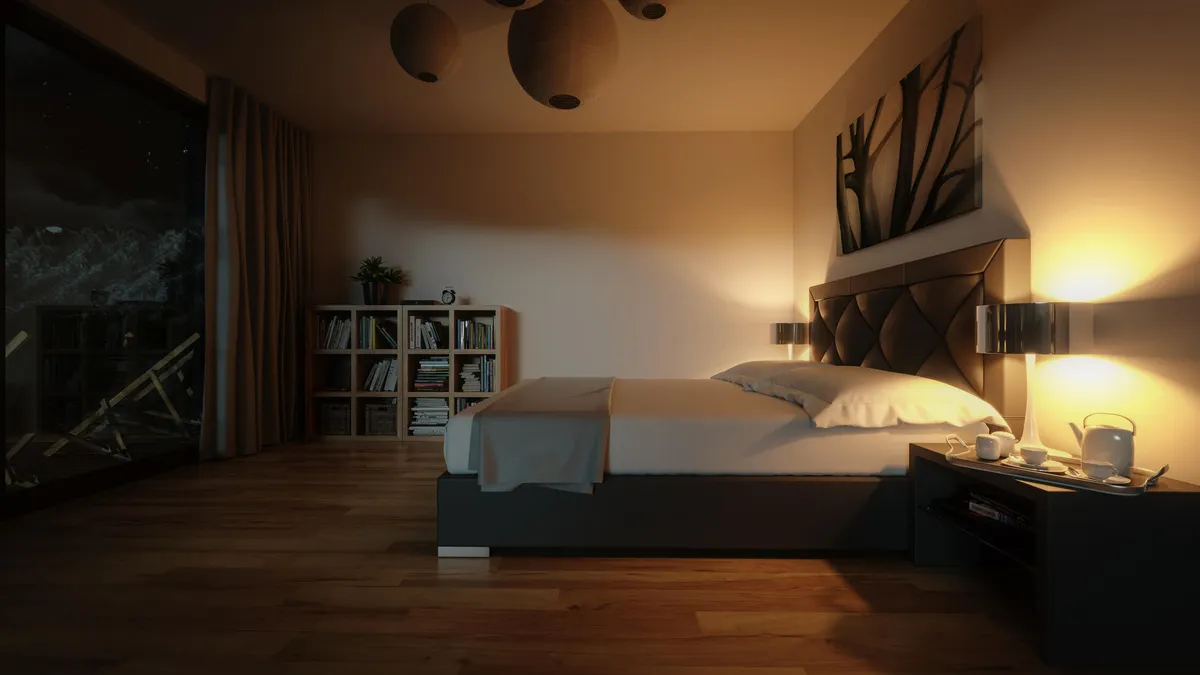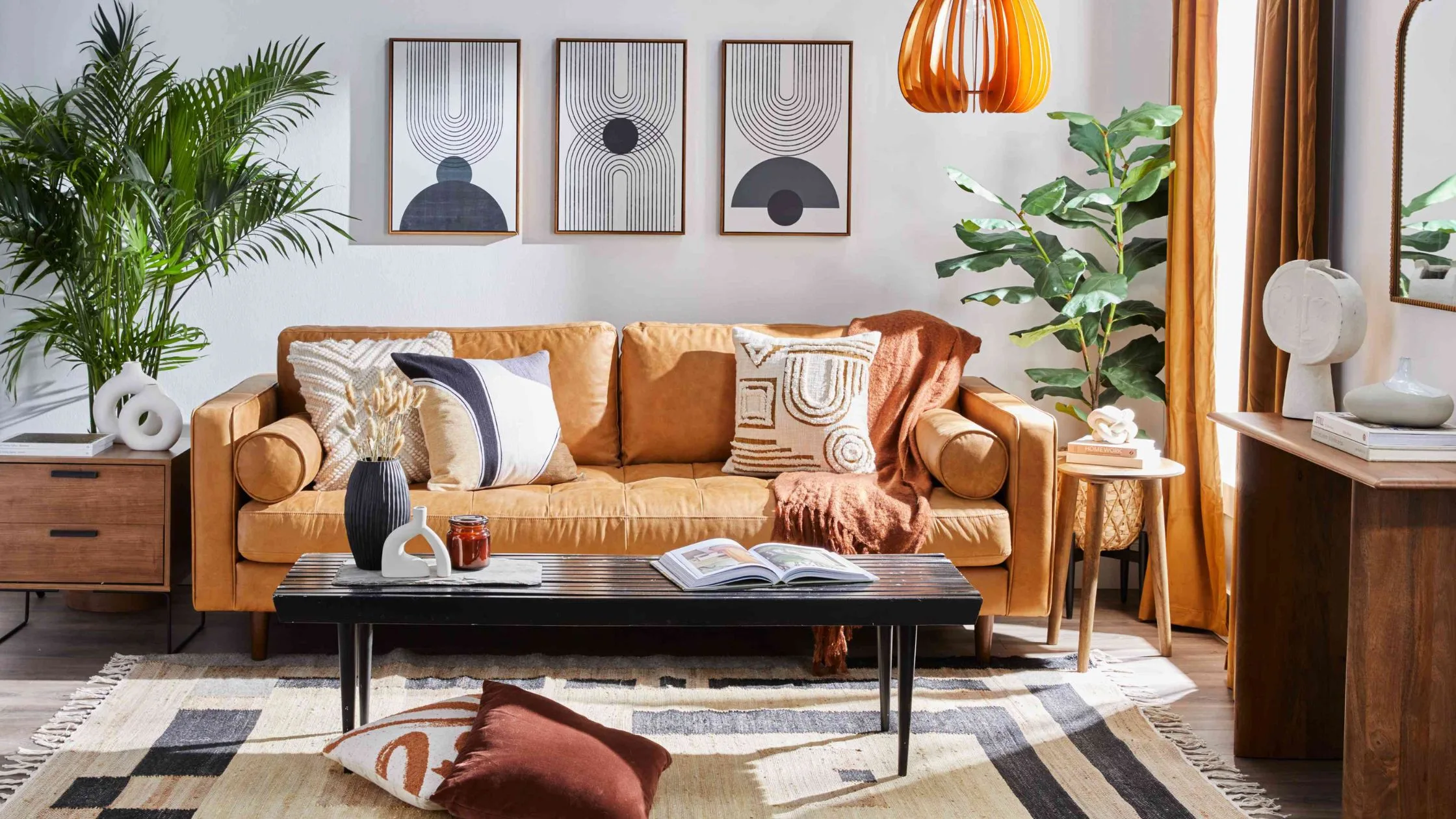Table of Content
▲
Your bedroom is a haven of rest where you retire after an exhausting day. It is a space where you can feel safe and comfortable enough to let loose and relax. Therefore, it is important to make sure that your bedroom serves this purpose the best it can. Good sleep is a rare commodity in the modern-day lifestyle but is highly crucial for the individual’s physical and mental well-being. So how can you ensure a good sleep? While a lot depends on your personal lifestyle and schedule, you can certainly improve the quality of your sleep by making some simple modifications to your bedroom space. Wondering how? Read on to find out the ways in which you can optimise your bedroom for better sleep.
Darken the room
Ensure optimal conditions for falling asleep by eliminating any potential sources of light, no matter how minor, that could disrupt your circadian rhythm or impede the process of falling asleep. Turn off light fixtures, stow away electronic devices emitting bright light, and close the curtains to block external light as much as possible, thus promoting a conducive environment for a restful sleep.
Comfortable mattress and pillows
Falling asleep is difficult when the body is not at rest due to physical discomfort. To avoid this, invest in comfortable mattresses and pillows that provide the suitable kind of support to your body. If the mattress is too firm or too soft, it can be uncomfortable and might lead to difficulty in getting restful sleep,
Also Read: Interior Bohemian Designs: 8 Ways To Style Your Home In A Bohemian Way
Maintain optimal temperature
It is easier for the human body to regulate its temperature when in the state of slumber. Therefore, set your thermostat to keep the room temperature slightly on the lower side to ensure comfort once asleep. Using breathable materials for bedding also goes a long way in controlling excessive body heat.
Reduce noise
External noises are a common source of disruption of peaceful sleep. To block these noises, the first step is to identify their sources in and around the bedroom. If the noises are unavoidable, you can consider using earplugs, a white noise machine, or more permanent soundproofing measures for your bedroom.
Limit screen time
Keeping your devices away at least an hour before bedtime goes a long way in ensuring restful sleep. Make your bedroom a technology-free zone for a while before you go to sleep since the blue light and radiation emitting from screens can hamper melatonin production in your body, causing difficulty in falling asleep.
Fix a sleep schedule
A consistent pre-sleep routine is a signal to your body of the time to relax and wind down. Incorporate relaxing and non-stimulating activities in your pre-sleep routine, such as reading, practising relaxation techniques, or taking a warm bath.
Create a relaxing atmosphere
Make sure that the general ambiance of your bedroom is relaxing and not highly stimulating. For this, it is recommended to use colours with soothing undertones, such as blue or earthy shades. Moreover, you can also incorporate elements such as rugs and minimalist artworks to add to the cosiness of the atmosphere.
Unclutter your space
Excessive clutter and a disorganised space might trigger uncomfortable feelings of stress and anxiety. This, in turn, makes it difficult for you to relax and fall asleep. Keeping your bedroom space clear of clutter promotes a harmonious environment that is conducive to a restful sleep.
Aromatherapy
Essential oils like lavender, chamomile, or eucalyptus have a calming effect on the mental state. Incorporating aromatherapy in your pre-sleep routine helps you to relax and fall asleep easily. You can do this by either using a diffuser to disperse the fragrance throughout your bedroom or directly apply the oils on your pulse points.
Invest in blackout curtains
Blackout curtains not only keep light from entering your room but also provide insulation for the maintenance of optimal indoor temperature. The complete absence of light and a consistent bedroom temperature positively impacts the quality of your sleep.
Install dimmer switches
Dimmer switches for bedroom lights serve the purpose of gradually dimming the intensity of the light fixtures by and by as you prepare for bedtime. It tries to replicate the natural fading of the daylight, thereby signalling your body that it is time to rest.
Limit bedroom activities
Avoid using the bedroom space for activities that can be done elsewhere and restrict it only for relaxation. For example – do not watch TV or work till late in your bedroom to establish a clear association of your body and mind with the purpose of the space.
Introduce soft textures
Soft textures create a soothing and inviting ambiance in your bedroom that can help enhance the overall sleep quality. You can include such textures in your space by introducing plush rugs, cosy blankets and a comfy bedding.
Use natural light during daytime
Do not depend on artificial lighting alone to illuminate your space. Allowing ample natural light into your bedroom is important for the regulation of your circadian rhythm. When exposed to or woken up by natural light in the morning, your body is better able to regulate your sleep cycle at night.
Listen to calming music
Consider integrating a sound system in your bedroom, playing a curated playlist of tranquil music as part of your pre-sleep routine. This practice not only aids in lulling you into sleep but also serves to drown out disruptive noises, fostering a serene environment that promotes the relaxation of both body and mind.
Also Read: 3D HD Wallpaper | 3D Wallpaper Designs for Your Home


_1770964981.webp)







_1770976628.webp)
Ans 1. For small bedrooms, it is recommended to keep the space clutter free and use light colours to create an illusion of spaciousness. To ensure restful sleep, invest in quality mattresses and pillows that can be easily incorporated into any setup regardless of the size of the room.
Ans 2. Yes, a room’s colour can affect sleep quality. To ensure better sleep, go for calming colours like blues, greens and similar earthy tones as they promote a sense of tranquillity.
Ans 3. Using a fan or space eater helps to easily regulate room temperature. It is recommended to maintain a temperature between 15 - 20°C for restful sleep. It is also important to use season-appropriate bedding.
Ans 4. Breathable and natural materials such as cotton are ideal for bedding and sleepwear. Such materials are soft and comfortable, and also help to regulate body temperature.
Ans 5. Plants like lavender, jasmine and snake plants improve the quality of indoor air and also promote a calming atmosphere. Incorporating such plants enhances the overall ambiance of your bedroom space.
Ans 6. Using heavy curtains, carpets and wall decor are simple ways to soundproof your room. Make sure to address any gaps or openings that might be a portal for disruptive external noise to enter your bedroom space.
Ans 7. It is recommended to keep the workspace away from the bedroom since it disrupts the association of the body and mind to the purpose of the bedroom, that is rest and relaxation.